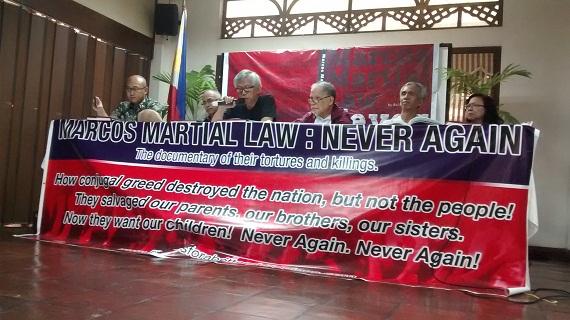HEADLINE
Dark martial law years haunt Philippine elections
"Human rights organizations, victims of torture, and the families of those who were killed and disappeared during the Marcos regime."

The dark years of martial law are back in the spotlight in the Philippines, with the only son of the former dictator, Ferdinand Marcos, running for vice president in the elections this May.
Human rights organizations, victims of torture, and the families of those who were killed and disappeared during the Marcos regime are speaking out against his campaign.
Jofelle Tesorio has more from Manila, the Philippines.
Famous activist and singer Noel Cabangon is singing the nationalistic song, My Country.
Most members of the audience raise their fists while singing in unison.
This is the launch of a book called, Marcos Martial Law: Never Again.
Two hundred and forty pages long, the book details stories before, during, and after martial law in the Philippines, from 1972 to 1981.
Political journalist Raissa Robles is the author.
“Together with me today are the living proof, living testimonies of what happened in martial law,” says Robles.
Raissa spent many years documenting the stories of victims like Bonifacio Ilagan, a student activist in the 70s who was detained and tortured by the regime.
“I'm happy that this book has come out because this a slap on Bongbong Marcos' face,” he says, “A man who positions himself as someone that has nothing to do with the martial law. I don't know how he will deny the book.”
Ferdinand Marcos' only son and namesake, known here as Bongbong Marcos, is now running for vice president.
Victims of tortures and detention, and families of those who were killed and disappeared along with the academics and human rights organizations want to prevent him from winning.
Bonifacio Ilagan explains how he was treated by the regime of Bongbong’s father.
“One of the torture methods they used then was what we called San Juanico Bridge,” he says, “They would let you lie down with your neck hanging on the side of the bed and your legs on the side of another bed as if you were floating on air. I was forced to stay in that position. If the interrogators didn't like my answer, they would punch me in the stomach. Then I would fall and then they would put me back in the same position.”
He was beaten and parts of his body were burned.
Bonifacio's sister, also a student activist then, was raped and executed.
She was part of the Southern Tagalog 10, the single biggest recorded case of political abduction during martial law.
“And the torture would go on for days, for weeks and months,” he continues, “Punching, kicking, and so on. When they were not interrogating, the guards would just call us and torture us.”
Other victims were subject to electric shocks to extract confessions.
Yet despite all the testimonies and a class action lawsuit filed by the victims against the Marcos estate in Hawaii, the Marcos family has never apologized.
The closest to an apology that Marcos’ son, Bongbong, made was through this interview with national television ABS CBN.
“If during the time of my father they were victimized in some way or another, of course we are sorry that it happened,” he says, “Nobody wants that to have happened. But will I say sorry to the thousands and thousands of kilometers of roads that were built? Will I say sorry for the agricultural policy that brought us to self-sufficiency in rice? Will I say sorry for the power generations? Will I say sorry for the highest literacy rate in Southeast Asia? What am I to say sorry about?”
And while economists says this claim is flawed, that hasn’t stopped the Marcos family from positioning themselves back into seats of power.
Imelda, the widow of the former dictator, famous for her extravagant shoe collection, is now a congresswoman. Bongbong, a senator, is a strong candidate to win the vice presidency, while his sister Imee, is a governor.
Author Raissa Robles says Filipinos have a kind of historical amnesia when it comes to the Marcos family.
“We forgot to educate the youth. We forgot to tell them what really happened during the Marcos dictatorship,” she explains, “What Bongbong Marcos has been able to do is to disengage himself from all the tortures and atrocities during that period and he keeps telling people that I have nothing to do with it while in fact, he does have something to do with it.”
Raissa hopes her book on martial law will help Filipinos decide on their future.
“I don't know what the impact is on the elections but I hope it will open the eyes of people on what leaders, not just Bongbong Marcos, promise,” she says, “Give me power and I'll do these for you in six months time. You better stop and pause.”
- Jofelle Tesorio
- Philippines election
- Bongbong Marcos
- eng
Komentar (0)
KBR percaya pembaca situs ini adalah orang-orang yang cerdas dan terpelajar. Karena itu mari kita gunakan kata-kata yang santun di dalam kolom komentar ini. Kalimat yang sopan, menjauhi prasangka SARA (suku, agama, ras dan antargolongan), pasti akan lebih didengar. Yuk, kita praktikkan!